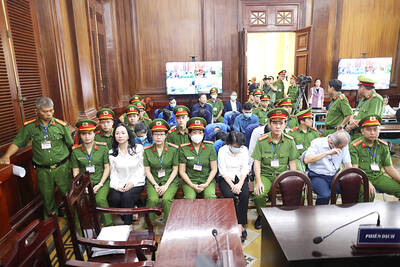Queen Elizabeth II was not informed in advance about the 1975 dismissal of Australia’s prime minister by her representative in the country, letters kept secret for decades and released yesterday revealed.
The British monarch’s representative in Australia, then-governor-general John Kerr, sparked a constitutional crisis when he abruptly fired Gough Whitlam, the democratically elected leader of the center-left Labor party.
The High Court in May ruled that more than 200 letters between the queen’s private secretary and Kerr — including many addressing the controversial affair — should be made public.

Photo: EPA-EFE
Although the correspondence show the queen was not told immediately prior to Whitlam’s sacking, they confirm that Kerr had exchanged extensive letters with the palace for months about his powers to oust the prime minister.
Suspicion the palace played a direct role in Whitlam’s ouster has long been cited by Australian Republicans arguing the country should break with the monarchy.
The National Archives of Australia released the 1,200 pages known as the “Palace Letters” yesterday after a four-year court battle to keep them hidden that reportedly cost A$2 million (US$1.4 million).
Historians are now combing through the documents to see if the British government tried to influence events in its former colony and what role the queen, Prince Charles and top royal advisers might have played.
One key extract shows Kerr informed the queen he had fired Whitlam shortly after taking the action on Nov. 11, 1975.
“I should say I decided to take the step I took without informing the Palace in advance because, under the Constitution, the responsibility is mine, and I was of the opinion it was better for Her Majesty not to know in advance, though it is of course my duty to tell her immediately,” he wrote.
The decision capped a protracted political stalemate after the opposition-controlled senate refused to pass the government’s budget, severely weakening Whitlam’s position.
The letters confirm the palace knew Kerr had been considering the options available to him under his constitutional “reserve powers,” which included dismissing Australia’s leader, an action no other governor-general has taken before or since.
“I’m also keeping my mind open as to the constitutional issues,” Kerr wrote to Martin Charteris, the queen’s private secretary, on Sept. 12, 1975.
“If the Prime Minister and the Leader of the Opposition get into a battle in which the Senate has defeated the budget, the Prime Minister refuses to recommend a dissolution, my role will need some careful thought,” he wrote.
Charteris later praised Kerr for his approach, writing a week before the dismissal he was “playing the vice-regal hand with skill and wisdom.”
“The fact you have powers is recognized. But it’s also clear you will only use them in the last resort, and then only for constitutional — and not for political — reasons,” he said.
Jenny Hocking, a professor and biographer of Whitlam who took the case to court, said the political nature of the correspondence was “startling” given the requirement for the head of a constitutional monarchy to remain neutral.
Hocking said the discussion of reserve powers in particular was “scandalous” because its existence in Australia is “highly contested” by legal and political scholars.
After sacking Whitlam, Kerr appointed opposition Liberal leader Malcolm Fraser as interim prime minister, sparking chaos in Canberra and protests on the steps of parliament.
Fraser went on to win a landslide election victory later that year.
Though Australia became independent in 1901, the queen is still head of state.
A referendum on becoming a republic failed in 1999, but republicans hope recent royal scandals could help revive efforts to cut ties with the monarchy.
Labor leader Anthony Albanese described the dismissal of a democratically elected government as “a blight on our character as a nation” that “reinforces the need for us to have an Australian head of state.”

Republican US lawmakers on Friday criticized US President Joe Biden’s administration after sanctioned Chinese telecoms equipment giant Huawei unveiled a laptop this week powered by an Intel artificial intelligence (AI) chip. The US placed Huawei on a trade restriction list in 2019 for contravening Iran sanctions, part of a broader effort to hobble Beijing’s technological advances. Placement on the list means the company’s suppliers have to seek a special, difficult-to-obtain license before shipping to it. One such license, issued by then-US president Donald Trump’s administration, has allowed Intel to ship central processors to Huawei for use in laptops since 2020. China hardliners

A top Vietnamese property tycoon was on Thursday sentenced to death in one of the biggest corruption cases in history, with an estimated US$27 billion in damages. A panel of three hand-picked jurors and two judges rejected all defense arguments by Truong My Lan, chair of major developer Van Thinh Phat, who was found guilty of swindling cash from Saigon Commercial Bank (SCB) over a decade. “The defendant’s actions ... eroded people’s trust in the leadership of the [Communist] Party and state,” read the verdict at the trial in Ho Chi Minh City. After the five-week trial, 85 others were also sentenced on

‘DELUSIONAL’: Targeting the families of Hamas’ leaders would not push the group to change its position or to give up its demands for Palestinians, Ismail Haniyeh said Israeli aircraft on Wednesday killed three sons of Hamas’ top political leader in the Gaza Strip, striking high-stakes targets at a time when Israel is holding delicate ceasefire negotiations with the militant group. Hamas said four of the leader’s grandchildren were also killed. Ismail Haniyeh’s sons are among the highest-profile figures to be killed in the war so far. Israel said they were Hamas operatives, and Haniyeh accused Israel of acting in “the spirit of revenge and murder.” The deaths threatened to strain the internationally mediated ceasefire talks, which appeared to gain steam in recent days even as the sides remain far

The Taliban’s reclusive supreme leader made a rare public appearance yesterday, an Afghan government spokesman said, leading thousands of worshipers in prayers marking Eid al-Fitr. Hibatullah Akhundzada has made only a handful of public appearances since inheriting the leadership of the Taliban in 2016 and leading the movement back to power with the withdrawal of US forces in 2021. Taliban government spokesman Zabihullah Mujahid said prayer in the largest mosque in Kandahar was “performed under the leadership of the supreme leader.” In a statement on X, he said the early-morning service “was attended by thousands of compatriots” in the southern province considered the